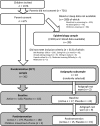Fatty acids and sleep in UK children: subjective and pilot objective sleep results from the DOLAB study--a randomized controlled trial - PubMed (original) (raw)
Randomized Controlled Trial
doi: 10.1111/jsr.12135. Epub 2014 Mar 8.
Affiliations
- PMID: 24605819
- PMCID: PMC4263155
- DOI: 10.1111/jsr.12135
Free PMC article
Randomized Controlled Trial
Fatty acids and sleep in UK children: subjective and pilot objective sleep results from the DOLAB study--a randomized controlled trial
Paul Montgomery et al. J Sleep Res. 2014 Aug.
Free PMC article
Abstract
Sleep problems in children are associated with poor health, behavioural and cognitive problems, as are deficiencies of long-chain omega-3 fatty acids such as docosahexaenoic acid. Theory and some evidence support a role for these fatty acids in sleep regulation, but this issue has received little formal investigation. We examined associations between blood fatty acid concentrations (from fingerstick blood samples) and subjective sleep (using an age-standardized parent questionnaire) in a large epidemiological sample of healthy children aged 7-9 years (n = 395) from mainstream UK schools. In a randomized controlled trial, we then explored whether 16-week supplementation (600 mg day(-1) ) with algal docosahexaenoic acid versus placebo might improve sleep in a subset of those children (n = 362) who were underperforming in reading. In a randomly selected subsample (n = 43), sleep was also assessed objectively via actigraphy. In 40% of the epidemiological sample, Child Sleep Habits Questionnaire scores indicated clinical-level sleep problems. Furthermore, poorer total sleep disturbance scores were associated weakly but significantly with lower blood docosahexaenoic acid (std coeff. -0.105*) and a lower docosahexaenoic acid : arachidonic acid ratio (std coeff. -0.119**). The treatment trial showed no significant effects on subjective sleep measures. However, in the small actigraphy subsample, docosahexaenoic acid supplementation led on average to seven fewer wake episodes and 58 min more sleep per night. Cautiously, we conclude that higher blood levels of docosahexaenoic acid may relate to better child sleep, as rated by parents. Exploratory pilot objective evidence from actigraphy suggests that docosahexaenoic acid supplementation may improve children's sleep, but further investigations are needed.
Keywords: actigraphy; children; docosahexaenoic acid; omega-3; randomized controlled trial; sleep.
© 2014 The Authors. Journal of Sleep Research published by John Wiley & Sons Ltd on behalf of European Sleep Research Society.
Figures
Figure 1
Flowchart.
Figure 2
Child Sleep Habits Questionnaire (CSHQ) total sleep disturbance distribution in the epidemiology sample.
Figure 3
Total min sleep: baseline, postintervention and change by treatment group.
Similar articles
- Docosahexaenoic acid for reading, cognition and behavior in children aged 7-9 years: a randomized, controlled trial (the DOLAB Study).
Richardson AJ, Burton JR, Sewell RP, Spreckelsen TF, Montgomery P. Richardson AJ, et al. PLoS One. 2012;7(9):e43909. doi: 10.1371/journal.pone.0043909. Epub 2012 Sep 6. PLoS One. 2012. PMID: 22970149 Free PMC article. Clinical Trial. - Docosahexaenoic Acid and Arachidonic Acid Supplementation and Sleep in Toddlers Born Preterm: Secondary Analysis of a Randomized Clinical Trial.
Boone KM, Rausch J, Pelak G, Li R, Turner AN, Klebanoff MA, Keim SA. Boone KM, et al. J Clin Sleep Med. 2019 Sep 15;15(9):1197-1208. doi: 10.5664/jcsm.7902. J Clin Sleep Med. 2019. PMID: 31538590 Free PMC article. Clinical Trial. - Low blood long chain omega-3 fatty acids in UK children are associated with poor cognitive performance and behavior: a cross-sectional analysis from the DOLAB study.
Montgomery P, Burton JR, Sewell RP, Spreckelsen TF, Richardson AJ. Montgomery P, et al. PLoS One. 2013 Jun 24;8(6):e66697. doi: 10.1371/journal.pone.0066697. Print 2013. PLoS One. 2013. PMID: 23826114 Free PMC article. - Omega 3 fatty acids and inborn errors of metabolism.
Gil-Campos M, Sanjurjo Crespo P. Gil-Campos M, et al. Br J Nutr. 2012 Jun;107 Suppl 2:S129-36. doi: 10.1017/S0007114512001523. Br J Nutr. 2012. PMID: 22591887 Review.
Cited by
- Association between Erythrocyte Membrane Phospholipid Fatty Acids and Sleep Disturbance in Chinese Children and Adolescents.
Tang J, Yan Y, Zheng JS, Mi J, Li D. Tang J, et al. Nutrients. 2018 Mar 12;10(3):344. doi: 10.3390/nu10030344. Nutrients. 2018. PMID: 29534525 Free PMC article. - Polyunsaturated fatty acids moderate the effect of poor sleep on depression risk.
Lotrich FE, Sears B, McNamara RK. Lotrich FE, et al. Prostaglandins Leukot Essent Fatty Acids. 2016 Mar;106:19-25. doi: 10.1016/j.plefa.2015.10.004. Epub 2015 Nov 10. Prostaglandins Leukot Essent Fatty Acids. 2016. PMID: 26598106 Free PMC article. - Using the Coriell Personalized Medicine Collaborative Data to conduct a genome-wide association study of sleep duration.
Scheinfeldt LB, Gharani N, Kasper RS, Schmidlen TJ, Gordon ES, Jarvis JP, Delaney S, Kronenthal CJ, Gerry NP, Christman MF. Scheinfeldt LB, et al. Am J Med Genet B Neuropsychiatr Genet. 2015 Dec;168(8):697-705. doi: 10.1002/ajmg.b.32362. Epub 2015 Sep 3. Am J Med Genet B Neuropsychiatr Genet. 2015. PMID: 26333835 Free PMC article. - Promising Sources of Plant-Derived Polyunsaturated Fatty Acids: A Narrative Review.
Rizzo G, Baroni L, Lombardo M. Rizzo G, et al. Int J Environ Res Public Health. 2023 Jan 17;20(3):1683. doi: 10.3390/ijerph20031683. Int J Environ Res Public Health. 2023. PMID: 36767052 Free PMC article. Review. - Plasma DHA Is Related to Sleep Timing and Duration in a Cohort of Mexican Adolescents.
Jansen EC, Conroy DA, Burgess HJ, O'Brien LM, Cantoral A, Téllez-Rojo MM, Peterson KE, Baylin A. Jansen EC, et al. J Nutr. 2020 Mar 1;150(3):592-598. doi: 10.1093/jn/nxz286. J Nutr. 2020. PMID: 31758194 Free PMC article.
References
- Bailey-Hall E, Nelson EB, Ryan AS. Validation of a rapid measure of blood PUFA levels in humans. Lipids. 2008;43:181–186. - PubMed
- Burgess JR, Stevens L, Zhang W, Peck L. Long-chain polyunsaturated fatty acids in children with attention-deficit hyperactivity disorder. Am. J. Clin. Nutr. 2000;71(Suppl. 1):327S–330S. - PubMed
- Catala A. The function of very long chain polyunsaturated fatty acids in the pineal gland. Biochim. Biophys. Acta. 2010;1801:95–99. - PubMed
- Cheruku SR, Montgomery-Downs HE, Farkas SL, Thoman EB, Lammi-Keefe CJ. Higher maternal plasma docosahexaenoic acid during pregnancy is associated with more mature neonatal sleep-state patterning. Am. J. Clin. Nutr. 2002;76:608–613. - PubMed
Publication types
MeSH terms
Substances
LinkOut - more resources
Full Text Sources
Other Literature Sources
Research Materials


